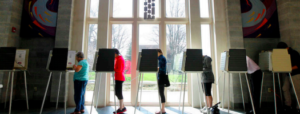A compulsory voting policy undermines the liberty that voting is supposed to represent. Moreover, a government-imposed system that forces people to take the time out of their day to vote for issues that they often don’t understand or don’t care about is damaging to the political process.
In the United States, it is your right as a citizen to have your opinion considered in government decisions that affect you through the election of representatives. Sadly, in some cases, citizens who want to voice their opinions in elections are unable to do so because of financial strain, lack of access, or invalid forms of identification, among other reasons. This disenfranchisement is certainly an issue, but it is important not to conflate access to voting with the actual act of voting. All citizens should have the opportunity to vote, but citizens should not be required to use that opportunity if they choose not to.
Compulsory voting means classifying voting as a duty rather than a right. Jury duty, for example, is a compulsory duty required of American citizens because the judicial system could not function without mandated participation. Not enough citizens would voluntarily serve on a jury, so the government must require these duties of them. Voting, on the other hand, is not contingent on a certain number of people participating in the process; an election without full participation still produces an outcome. Thus, the government has no justification for considering voting a duty, since the political system does not collapse as a result of low voter turnout.
According to the Pew Research Center, among voters who chose not to vote in the 2016 presidential election, approximately 15% abstained because they weren’t interested in or didn’t care about the issues or candidates being voted on. In countries such as Australia, where voting is mandatory, many citizens fill out blank or random ballots just to satisfy the policy, thereby wasting time and resources. According to BBC News, these ballots actually account for approximately 6% of voters. If a compulsory voting policy was introduced in the U.S., the government would have to deal with an influx of blank ballots and random ballots undermining the opinions of the informed and interested population.
The First Amendment prohibits Congress from passing a law curtailing the freedom of speech, thereby guaranteeing free speech to all citizens. Since free speech includes the freedom not to speak, compulsory voting is essentially forced speech, which goes against the First Amendment. If citizens are forced to voice an opinion on the government, does that government really represent the citizens?
Making voting compulsory in the United States sacrifices the liberty of the citizens in favor of false democracy. Voting is a right, and citizens should vote in order to have a say in the government that will dictate many aspects of their lives — but they should not be forced to have that say. An election in which a large portion of the voters is not actively interested in the results reduces the legitimacy of the government. The United States should promote political participation, not mandate it.





